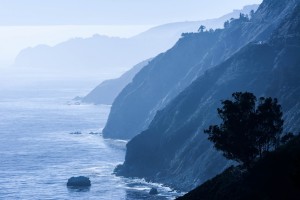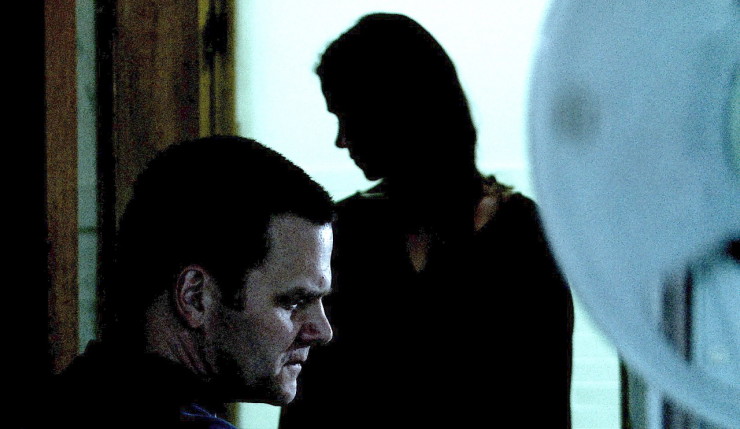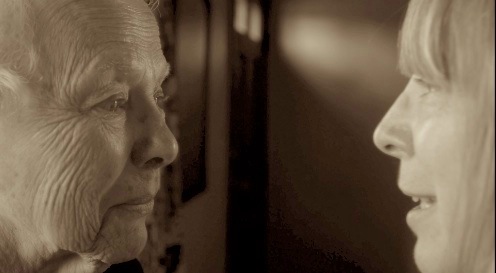In this, the concluding segment of my three-part interview with Janet R. Kirchheimer, I speak with the poet and filmmaker about the conception of her Holocaust-related project BE•HOLD, currently in production, and her objectives for the performance film.
Poems on Film—‘Language Itself Becomes a Character’
Tell us about your project BE•HOLD, what prompted it and its current status.
The film came out of the director Richard Kroehling’s and my love of poetry and film. We believe they can be brought together for profound results.
BE•HOLD explores poetry about the Holocaust from the rise of Nazism to the current day. A fusion of cinema and poetry, the film is structured somewhat like Wim Wenders’s dance film “Pina”. Each poem has its own style and visual island, evoking a range of emotions. Poets and survivors and their descendants present the poems, creating a deep well of voices responding to evil and genocide. Between each poem-film will be music or interviews with experts (historians, poets, etc.).
Capturing a wide range of experiences, we will pull the audience into a deeply examined world of poetry and the Holocaust, so their lives will resonate with the poets’, allowing viewers to engage with history through a vibrant and contemporary lens. In BE•HOLD, language itself becomes a character.
Shifting focus to the interior states of each work, poems lift off from the page to the screen. It is our hope that new, personal meanings for the audience will emerge from the juxtaposition of the poems, the unique approach to each piece, the performances, cinematography, art direction, music, and uses of sound and silence.
The team making the film is director Richard Kroehling, owner of Lumen Productions and a two-time Emmy Award winner who directed A. Einstein: How I See the World for the PBS American Masters Series; cinematographer Lisa Rinzler, a multiple-award winner who has shot more than 50 feature films; and I, the film’s producer.
We’re currently in production and are filming [the month of May]. Like most independent films, we are trying to raise enough funds to complete production.
In selecting poems for BE•HOLD, what criteria have you applied?
It’s been an interesting process. There are poems that blew off the tops of our heads but they wouldn’t work on film. We look for poems that are both amazing and will leap onto the screen. We’re also working to find a variety of poems—[from] those written before, during, and immediately after the Shoah, to those poems being written today by both Jews and non-Jews.
Jury Duty
“Welcome to jury duty.
We’ll try to make this as painless
as possible, ” says the man in charge.
He means it as a joke.
I notice he carries a gun.
I begin to knit, knit one,
purl two, knit one, purl two,
the needles click-clack.
He announces we are about to begin
the selection process.
I drop a stitch.
“If I call your name report to the left.”
He calls my name.
—Janet R. Kirchheimer
In a post for John Guzlowski’s blog, Lightning and Ashes, you quote poet Jane Hirschfield, who wrote, “Poetry’s work is the clarification and magnification of being.” What new insights do the poems in BE•HOLD afford us, and how do they accomplish your objectives for the film?
It is my goal that the poems in BE•HOLD do exactly that. I believe that poetry shows us what it is to be human. The film presents a variety of poetry that speaks to different eras: a poem found after the war buried in the Warsaw Ghetto, read by Cornelius Eady; a poem about being married to a daughter of survivors, written and read by Taylor Mali; poems from the granddaughter of survivors and an Israeli poet. And more that we will film. The poems are not only about death. They also are about life.
I hope that viewers will see how poetry can help preserve memory. I also hope these poems will move people to remember, to learn more about the Holocaust and other genocides, and to work in some way to help prevent them. Jewish wisdom says that remembering without action serves no purpose.
The number of survivors of the Holocaust declines the farther we get from World War II, and the generation after them—a generation that took up their stories in remembrance—is aging. Is the kind of personal responsibility you feel to “never forget” also shared by the generation that follows ours? And, if not, to what do we look to not only remember, pay tribute, and impart relevance but also to ensure that the lessons of the Holocaust are not lost to the future?
Maybe it’s because I’m a poet and a teacher, or maybe it’s just the way I am wired, but I do feel a responsibility to remember. I was that kid who asked about the kinds of food my parents ate in Germany, the sports they played, about wearing lederhosen, what school was like, and so much more. I wanted to know about life before the Shoah. My parents knew that. I’ve only known a world after. I also wanted to know how [my parents] began new lives in this country.
There are grandchildren of survivors’ groups who are working to preserve memory and doing marvelous work in schools. I believe that we must know history; academic studies to learn about the Holocaust are necessary. I also believe that artistic expressions are important ways to remember.
It’s hard for me to talk about the lessons from the Holocaust. For me, the only lesson is to not let it happen again—not just to Jews but to anyone. Never again was the cry after the Holocaust. Unfortunately, the world has not heeded it. Genocides keep occurring. We are quite good at killing one another. My mother says that human life is a cheap commodity.
Can you share with us what’s next on your creative horizon?
Right now, BE•HOLD is my biggest creative horizon. I think poetry and film are connected and, since working on the film, I am seeing both in a new light.
I would like to make a short film of one of my non-Holocaust poems, and ideas are percolating for that. Also, I am working with Aliza Augustine on artists’ hand-made books of “How to Spot One of Us”, and we’re working to get more exhibits.
I’m always in the middle of writing something. These days, I’m writing nonfiction and even trying some fiction. Poetry is my first love but it’s been fun working in another form. Poetry ideas have been rumbling, and I’m editing old work. I’m also hoping to take voice lessons over the summer.
Tell Me, Josef
Do you know that the clouds of summer still
give way to the clear skies of fall, that at
sunset the horizon seems to tumble from blue,
pink, and orange to black ink that spills
across the sky, and do you know that I dream
you were liberated from Auschwitz, that you
returned to Maastricht and visited your friend Paul, and
he returned the leather schoolbag you gave him
the night before you were deported, and
he gave you the four postcards you sent him
from Westerbork before you were sent to Auschwitz, and
do you know that the postcards you wrote
were given by Paul to the Joods Historisch Museum in Amsterdam, and
I found copies on the Internet, and do you know
I will travel to the museum this January to meet Paul and
see the words you wrote as an eleven-year-old,
the words that are here now in place of you, and
tell me, Josef, do you know that sometimes
in the middle of the night, I look out the window
and watch the sky and
I see rain begin to fall and watch
more fall down?
—Janet R. Kirchheimer
Featured image by Jérémy Lelièvre, Creative Commons license via Flickr. Post photos and poems by Janet R. Kirchheimer. Interview by Maureen E. Doallas, author of Neruda’s Memoirs: Poems.

For further reference:
Part 1 of Janet R. Kirchheimer Interview
Part 2 of Janet R. Kirchheimer Interview
Janet R. Kirchheimer on Facebook and Twitter
BE•HOLD on Facebook
Jewish Writing Project
________________________
Writing Workshop: Becoming Mindful in Place

- Persecuted Poets: Hearing the Voices Beyond Our Borders - November 30, 2016
- Writing with Matisse in Mind - October 26, 2016
- Healing with Poetry: Interview with Fred Foote (Part 3) - September 10, 2015



Richard Maxson says
There are so many reasons to remember the cruelties of human kind, along with the kindnesses. One should never be without the other as this series has demonstrated.
I applaud all those involved in the poetry, the photographs and the film serving as our memory and our teacher that human power carries an awesome burden of responsibility and empathy in its use.
Thanks to Janet Kirchheimer for her work and compassion. And you are so appreciated, Maureen, for bringing this work to our attention in such a memorable series.
Maureen Doallas says
Thank you so much for reading and commenting, Richard. I agree that the work of Janet, Eliza, and others who lost family members in the Holocaust is profoundly important. The memory of what was done should always be like the thorn on a rose.
I give thanks, as well, to Aliza Augustine. I am hoping her and Janet’s exhibition might come to the D.C. area.